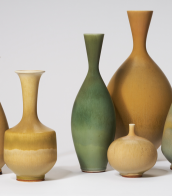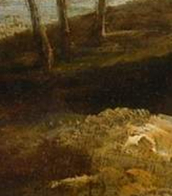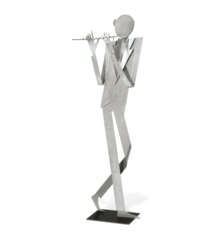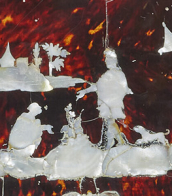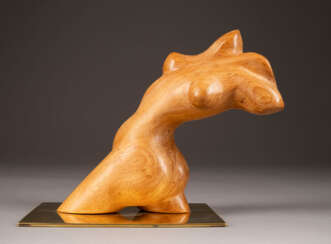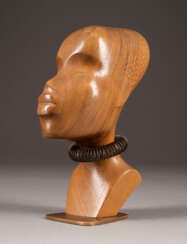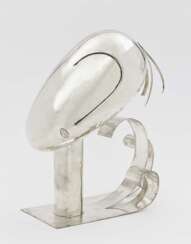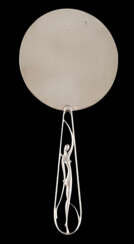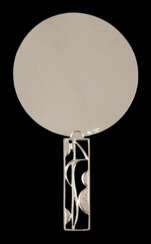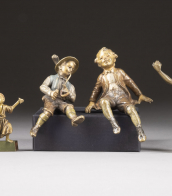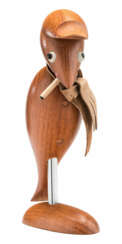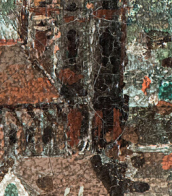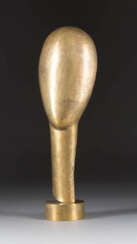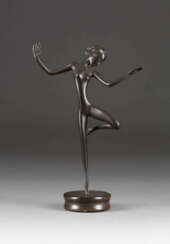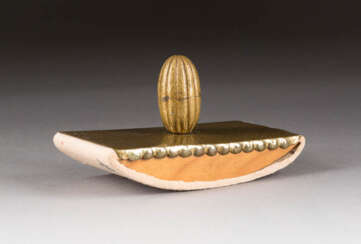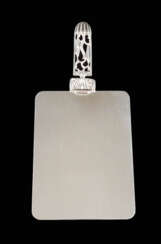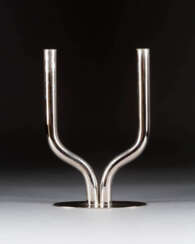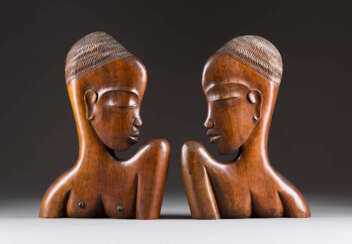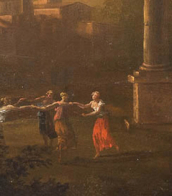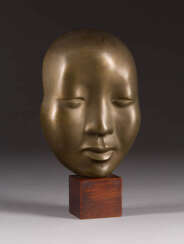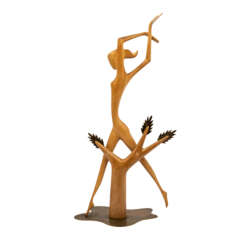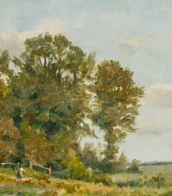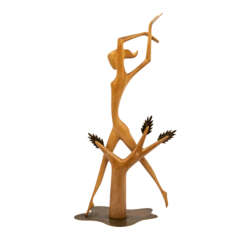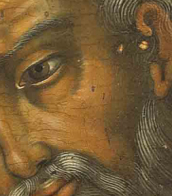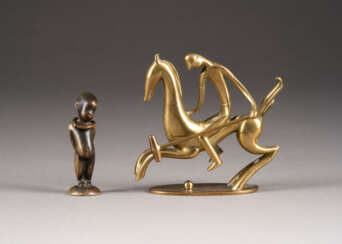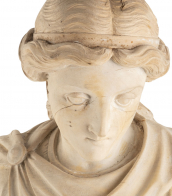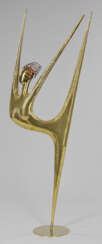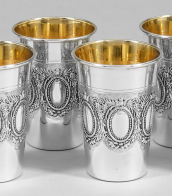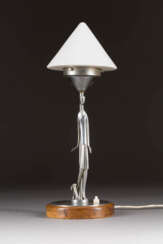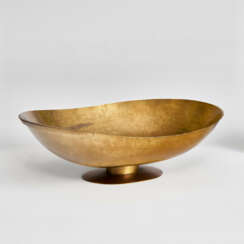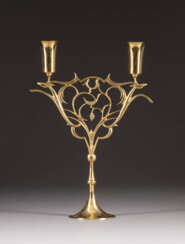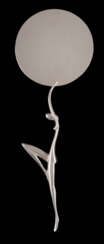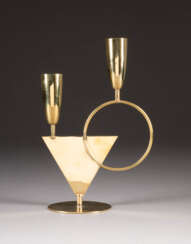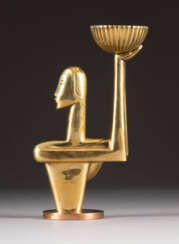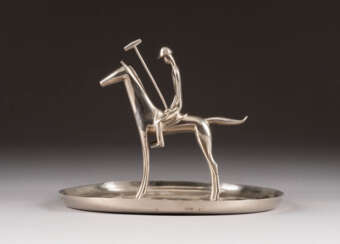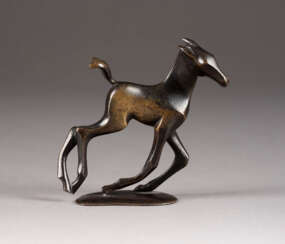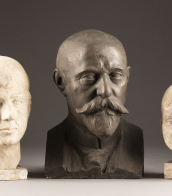franz hagenauer (1906 - 1986)
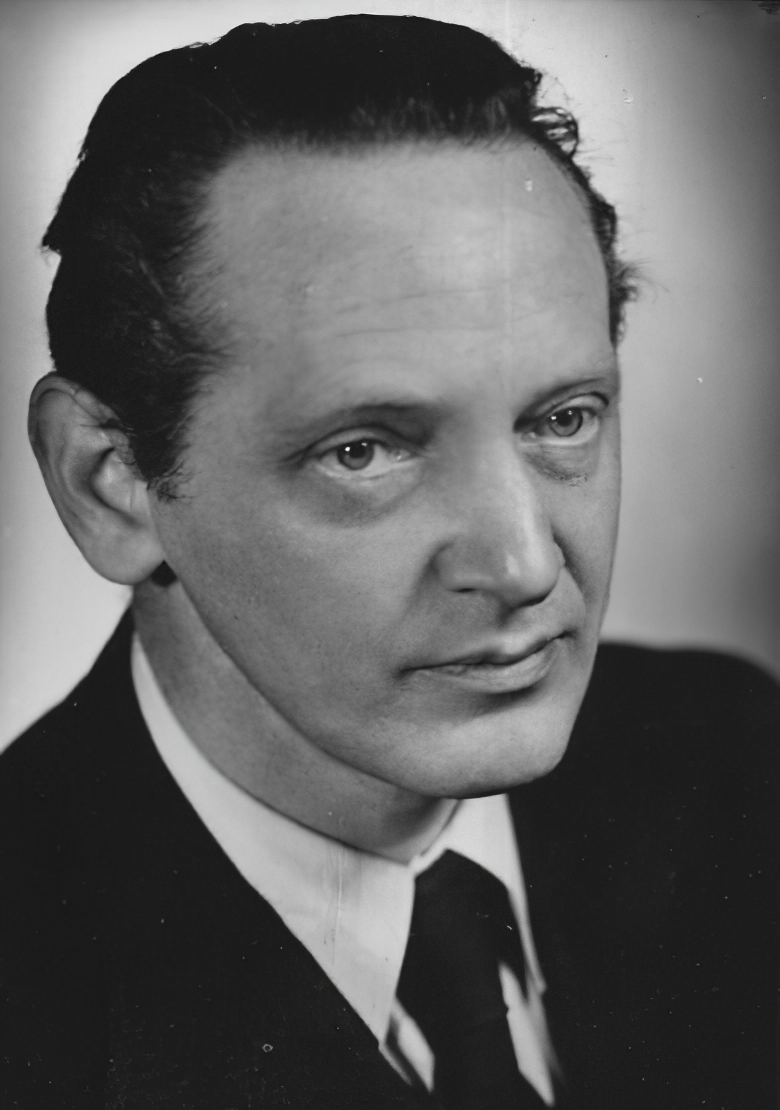
Franz Hagenauer was an Austrian artist renowned for his significant contributions to the field of sculpture and decorative arts. Hagenauer embarked on a creative journey marked by a deep exploration of form and material, leading him to become a pivotal figure in Austrian art and design. He specialized in sculptures that often depicted the human form and wildlife, utilizing sheet metals to create pieces that were not only artistic but also deeply rooted in the craftsmanship tradition.
Franz Hagenauer's journey into the world of art was nurtured through his education, which included classes in ornamental form theory and sculpture, as well as a stint in metalwork under the guidance of renowned artists and educators. By the age of 25, his talents had already earned him membership in the Vienna Secession, highlighting his early recognition in the art community. His artistic direction was further influenced by his involvement in his father's workshop, the Werkstätte Hagenauer, which he eventually led after his brother Karl's death in 1956. This period saw the workshop gain international fame for its exquisite metal objects and furniture.
Throughout his career, Franz Hagenauer's work received wide acclaim and was showcased in numerous exhibitions. His pieces, characterized by their innovative use of metal and wood, can be found in prestigious collections, including the Leopold Museum in Vienna. The museum has hosted exhibitions featuring Hagenauer's work, offering insights into his creative process and the evolution of his style over the decades.
The Werkstätte Franz Hagenauer itself played a crucial role in the development of Viennese modernist design, with Franz and his brother Karl expanding the scope of their father's workshop to explore new forms and expressions. The workshop's legacy, which Franz helped to shape, is documented in various exhibitions, underlining the lasting impact of the Hagenauer family on the design world.
For collectors and experts in art and antiques, Franz Hagenauer's creations represent a unique blend of artistic innovation and traditional craftsmanship. His works not only reflect the aesthetic movements of his time, including Jugendstil and Art Deco, but also stand as testaments to the enduring appeal of Viennese modernism.
To stay updated on new discoveries and events related to Franz Hagenauer's work, signing up for updates is an excellent way to ensure you're informed about the latest sales and auction events. This subscription will provide valuable insights and opportunities for enthusiasts and collectors alike to engage with the legacy of a remarkable artist whose work continues to inspire and captivate audiences around the world.
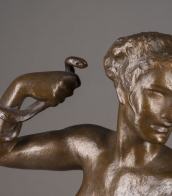

Franz Hagenauer was an Austrian artist renowned for his significant contributions to the field of sculpture and decorative arts. Hagenauer embarked on a creative journey marked by a deep exploration of form and material, leading him to become a pivotal figure in Austrian art and design. He specialized in sculptures that often depicted the human form and wildlife, utilizing sheet metals to create pieces that were not only artistic but also deeply rooted in the craftsmanship tradition.
Franz Hagenauer's journey into the world of art was nurtured through his education, which included classes in ornamental form theory and sculpture, as well as a stint in metalwork under the guidance of renowned artists and educators. By the age of 25, his talents had already earned him membership in the Vienna Secession, highlighting his early recognition in the art community. His artistic direction was further influenced by his involvement in his father's workshop, the Werkstätte Hagenauer, which he eventually led after his brother Karl's death in 1956. This period saw the workshop gain international fame for its exquisite metal objects and furniture.
Throughout his career, Franz Hagenauer's work received wide acclaim and was showcased in numerous exhibitions. His pieces, characterized by their innovative use of metal and wood, can be found in prestigious collections, including the Leopold Museum in Vienna. The museum has hosted exhibitions featuring Hagenauer's work, offering insights into his creative process and the evolution of his style over the decades.
The Werkstätte Franz Hagenauer itself played a crucial role in the development of Viennese modernist design, with Franz and his brother Karl expanding the scope of their father's workshop to explore new forms and expressions. The workshop's legacy, which Franz helped to shape, is documented in various exhibitions, underlining the lasting impact of the Hagenauer family on the design world.
For collectors and experts in art and antiques, Franz Hagenauer's creations represent a unique blend of artistic innovation and traditional craftsmanship. His works not only reflect the aesthetic movements of his time, including Jugendstil and Art Deco, but also stand as testaments to the enduring appeal of Viennese modernism.
To stay updated on new discoveries and events related to Franz Hagenauer's work, signing up for updates is an excellent way to ensure you're informed about the latest sales and auction events. This subscription will provide valuable insights and opportunities for enthusiasts and collectors alike to engage with the legacy of a remarkable artist whose work continues to inspire and captivate audiences around the world.


Franz Hagenauer was an Austrian artist renowned for his significant contributions to the field of sculpture and decorative arts. Hagenauer embarked on a creative journey marked by a deep exploration of form and material, leading him to become a pivotal figure in Austrian art and design. He specialized in sculptures that often depicted the human form and wildlife, utilizing sheet metals to create pieces that were not only artistic but also deeply rooted in the craftsmanship tradition.
Franz Hagenauer's journey into the world of art was nurtured through his education, which included classes in ornamental form theory and sculpture, as well as a stint in metalwork under the guidance of renowned artists and educators. By the age of 25, his talents had already earned him membership in the Vienna Secession, highlighting his early recognition in the art community. His artistic direction was further influenced by his involvement in his father's workshop, the Werkstätte Hagenauer, which he eventually led after his brother Karl's death in 1956. This period saw the workshop gain international fame for its exquisite metal objects and furniture.
Throughout his career, Franz Hagenauer's work received wide acclaim and was showcased in numerous exhibitions. His pieces, characterized by their innovative use of metal and wood, can be found in prestigious collections, including the Leopold Museum in Vienna. The museum has hosted exhibitions featuring Hagenauer's work, offering insights into his creative process and the evolution of his style over the decades.
The Werkstätte Franz Hagenauer itself played a crucial role in the development of Viennese modernist design, with Franz and his brother Karl expanding the scope of their father's workshop to explore new forms and expressions. The workshop's legacy, which Franz helped to shape, is documented in various exhibitions, underlining the lasting impact of the Hagenauer family on the design world.
For collectors and experts in art and antiques, Franz Hagenauer's creations represent a unique blend of artistic innovation and traditional craftsmanship. His works not only reflect the aesthetic movements of his time, including Jugendstil and Art Deco, but also stand as testaments to the enduring appeal of Viennese modernism.
To stay updated on new discoveries and events related to Franz Hagenauer's work, signing up for updates is an excellent way to ensure you're informed about the latest sales and auction events. This subscription will provide valuable insights and opportunities for enthusiasts and collectors alike to engage with the legacy of a remarkable artist whose work continues to inspire and captivate audiences around the world.
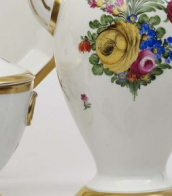

Franz Hagenauer was an Austrian artist renowned for his significant contributions to the field of sculpture and decorative arts. Hagenauer embarked on a creative journey marked by a deep exploration of form and material, leading him to become a pivotal figure in Austrian art and design. He specialized in sculptures that often depicted the human form and wildlife, utilizing sheet metals to create pieces that were not only artistic but also deeply rooted in the craftsmanship tradition.
Franz Hagenauer's journey into the world of art was nurtured through his education, which included classes in ornamental form theory and sculpture, as well as a stint in metalwork under the guidance of renowned artists and educators. By the age of 25, his talents had already earned him membership in the Vienna Secession, highlighting his early recognition in the art community. His artistic direction was further influenced by his involvement in his father's workshop, the Werkstätte Hagenauer, which he eventually led after his brother Karl's death in 1956. This period saw the workshop gain international fame for its exquisite metal objects and furniture.
Throughout his career, Franz Hagenauer's work received wide acclaim and was showcased in numerous exhibitions. His pieces, characterized by their innovative use of metal and wood, can be found in prestigious collections, including the Leopold Museum in Vienna. The museum has hosted exhibitions featuring Hagenauer's work, offering insights into his creative process and the evolution of his style over the decades.
The Werkstätte Franz Hagenauer itself played a crucial role in the development of Viennese modernist design, with Franz and his brother Karl expanding the scope of their father's workshop to explore new forms and expressions. The workshop's legacy, which Franz helped to shape, is documented in various exhibitions, underlining the lasting impact of the Hagenauer family on the design world.
For collectors and experts in art and antiques, Franz Hagenauer's creations represent a unique blend of artistic innovation and traditional craftsmanship. His works not only reflect the aesthetic movements of his time, including Jugendstil and Art Deco, but also stand as testaments to the enduring appeal of Viennese modernism.
To stay updated on new discoveries and events related to Franz Hagenauer's work, signing up for updates is an excellent way to ensure you're informed about the latest sales and auction events. This subscription will provide valuable insights and opportunities for enthusiasts and collectors alike to engage with the legacy of a remarkable artist whose work continues to inspire and captivate audiences around the world.
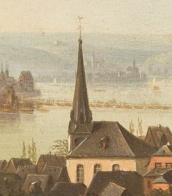

Franz Hagenauer was an Austrian artist renowned for his significant contributions to the field of sculpture and decorative arts. Hagenauer embarked on a creative journey marked by a deep exploration of form and material, leading him to become a pivotal figure in Austrian art and design. He specialized in sculptures that often depicted the human form and wildlife, utilizing sheet metals to create pieces that were not only artistic but also deeply rooted in the craftsmanship tradition.
Franz Hagenauer's journey into the world of art was nurtured through his education, which included classes in ornamental form theory and sculpture, as well as a stint in metalwork under the guidance of renowned artists and educators. By the age of 25, his talents had already earned him membership in the Vienna Secession, highlighting his early recognition in the art community. His artistic direction was further influenced by his involvement in his father's workshop, the Werkstätte Hagenauer, which he eventually led after his brother Karl's death in 1956. This period saw the workshop gain international fame for its exquisite metal objects and furniture.
Throughout his career, Franz Hagenauer's work received wide acclaim and was showcased in numerous exhibitions. His pieces, characterized by their innovative use of metal and wood, can be found in prestigious collections, including the Leopold Museum in Vienna. The museum has hosted exhibitions featuring Hagenauer's work, offering insights into his creative process and the evolution of his style over the decades.
The Werkstätte Franz Hagenauer itself played a crucial role in the development of Viennese modernist design, with Franz and his brother Karl expanding the scope of their father's workshop to explore new forms and expressions. The workshop's legacy, which Franz helped to shape, is documented in various exhibitions, underlining the lasting impact of the Hagenauer family on the design world.
For collectors and experts in art and antiques, Franz Hagenauer's creations represent a unique blend of artistic innovation and traditional craftsmanship. His works not only reflect the aesthetic movements of his time, including Jugendstil and Art Deco, but also stand as testaments to the enduring appeal of Viennese modernism.
To stay updated on new discoveries and events related to Franz Hagenauer's work, signing up for updates is an excellent way to ensure you're informed about the latest sales and auction events. This subscription will provide valuable insights and opportunities for enthusiasts and collectors alike to engage with the legacy of a remarkable artist whose work continues to inspire and captivate audiences around the world.


Franz Hagenauer was an Austrian artist renowned for his significant contributions to the field of sculpture and decorative arts. Hagenauer embarked on a creative journey marked by a deep exploration of form and material, leading him to become a pivotal figure in Austrian art and design. He specialized in sculptures that often depicted the human form and wildlife, utilizing sheet metals to create pieces that were not only artistic but also deeply rooted in the craftsmanship tradition.
Franz Hagenauer's journey into the world of art was nurtured through his education, which included classes in ornamental form theory and sculpture, as well as a stint in metalwork under the guidance of renowned artists and educators. By the age of 25, his talents had already earned him membership in the Vienna Secession, highlighting his early recognition in the art community. His artistic direction was further influenced by his involvement in his father's workshop, the Werkstätte Hagenauer, which he eventually led after his brother Karl's death in 1956. This period saw the workshop gain international fame for its exquisite metal objects and furniture.
Throughout his career, Franz Hagenauer's work received wide acclaim and was showcased in numerous exhibitions. His pieces, characterized by their innovative use of metal and wood, can be found in prestigious collections, including the Leopold Museum in Vienna. The museum has hosted exhibitions featuring Hagenauer's work, offering insights into his creative process and the evolution of his style over the decades.
The Werkstätte Franz Hagenauer itself played a crucial role in the development of Viennese modernist design, with Franz and his brother Karl expanding the scope of their father's workshop to explore new forms and expressions. The workshop's legacy, which Franz helped to shape, is documented in various exhibitions, underlining the lasting impact of the Hagenauer family on the design world.
For collectors and experts in art and antiques, Franz Hagenauer's creations represent a unique blend of artistic innovation and traditional craftsmanship. His works not only reflect the aesthetic movements of his time, including Jugendstil and Art Deco, but also stand as testaments to the enduring appeal of Viennese modernism.
To stay updated on new discoveries and events related to Franz Hagenauer's work, signing up for updates is an excellent way to ensure you're informed about the latest sales and auction events. This subscription will provide valuable insights and opportunities for enthusiasts and collectors alike to engage with the legacy of a remarkable artist whose work continues to inspire and captivate audiences around the world.
